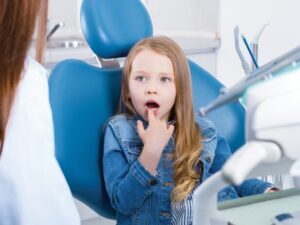Keeping kids’ smiles healthy takes more than regular dental checkups (which should begin around 18 months) and brushing twice daily. In addition to the normal loss of baby teeth and a cavity or two, many children will experience some type of tooth-related trauma, like a chipped tooth or one that suddenly turns grey, at some point. While childhood dental dramas are common, experts warn against ignoring them because problems with baby teeth can affect the developing permanent teeth below. Discover what you can do to help with dental problems, from minor mishaps and true emergencies to keep baby teeth beaming and big-kid grins gleaming.
EARLY YEARS 0-5
Shades of Gray
Many parents are dismayed to discover that one of their toddler’s pearly whites isn’t white at all–think grey or light brown. A tooth that suddenly darkens is fairly common. Baby teeth have shallower roots than permanent teeth, so they can die with even a slight bump, causing them to lose their white luster. Dentists generally advise a “wait and see” approach to a graying baby tooth because it’s usually just an aesthetic issue–dying baby teeth sometimes heal–and a dead baby tooth may not create any further problems or harm adult teeth, says pediatric dentist Sabrina Magid Katz, DMD.
A graying baby tooth may become infected, which sometimes causes a tiny pustule on the gums above the tooth; a dentist can extract it and help treat the underlying infection. If the tooth has to go, take heart–it won’t affect spacing of the permanent teeth, and your little one may get to be the first of his pals to get a visit from the Tooth Fairy.
ELEMENTARY YEARS 6-12
Knockout
During the school years, kids lose most of their baby teeth and learn to care for their new adult choppers. And because children are so active during this stage, it’s not uncommon to knock out a tooth–ouch. A knocked-out tooth is a true dental emergency that warrants a call to your dentist. The Greensboro Center for Pediatric Dentistry advises keeping the tooth damp so it doesn’t dry out; if possible, have the child hold it in place with a finger. If the tooth is a permanent one, your dentist may be able to restore it in its original position. But knocked-out baby teeth aren’t re-implanted, as that can damage the adult teeth underneath.
Another common dental dilemma among elementary-aged children: permanent teeth coming in before baby teeth fall out, resulting in multiple “rows” of teeth. This can look odd, but it’s not that big of a deal, says Dr. Magid Katz. The tongue will push the permanent teeth into alignment once the baby teeth fall out. Encourage your child to keep wiggling the baby teeth. If one is particularly stubborn, your dentist can help coax it out.
TEEN YEARS 13-18
Chip Off the Old Block
Chomping ice, using teeth to open a bottle, or playing sports can lead to something most teens don’t want in their yearbook photo: a chipped tooth. When is a chipped tooth an emergency? While minor chips are mostly an aesthetic issue, a larger chip can expose nerve endings that make a tooth temperature sensitive and painful, says Dr. Magid Katz. If your child chips a tooth, try to locate the missing piece, put it in water and call your dentist. A severe break may qualify as an emergency, while more minor chips can wait until the next business day.
If the broken piece can’t be found, your dentist can create a composite filling to restore the tooth; composites look natural and can last for years, though your child may need to replace it at some point in his lifetime. To avoid chips, have teens wear mouthguards for sports, and advise them to never use teeth as “tools”–and always model healthy dental habits by refraining from this practice yourself.
7 Tips from the Tooth Fairy
When it comes to teeth, the Tooth Fairy certainly knows a thing or two about terrific chompers. Here are a few tips to help promote good dental habits.
- See the dentist. Children should get their first oral exam when their first tooth has come in.
- Choose a dental home. Bouncing around from dentist to dentist isn’t the best idea. Choose a dentist early on, so your child can become comfortable with the dentist and his or her office and staff. A kid-friendly office is often a great choice.
- Keep all dentist talk positive. If you have fears of the dentist, try not to discuss them in front of your child. You could potentially create a fear in him, so talk calmly and happily leading up to the appointment.
- Bring a stuffed animal or blanket. If your child has an item that brings him comfort, let him bring it to the appointment to hold.
- Praise your child after the appointment. Appointments can be scary, so be sure to give your child praise for making it through the appointment.
- Remember to brush! Make sure your child is practicing good dental hygiene, including flossing his pearly whites.
- Keep dental visits regular. As your child gets older, it’s important that he remembers to continue visiting the dentist to help prevent cavities and other dental trouble in the future.
For more information, visit kidshealth.org.





